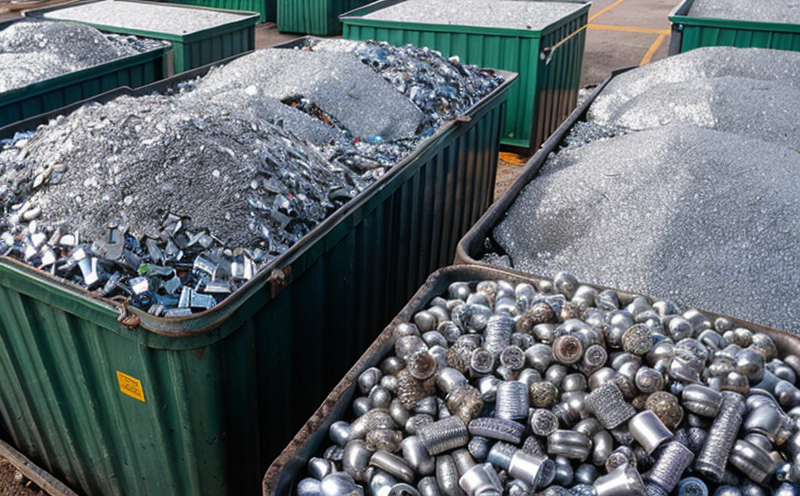ASTM E130 Indium Content in Recycled Metals
The ASTM E130 standard method is a critical tool used to determine indium content in recycled metals, particularly those derived from electronics and other industrial waste. This test ensures that the recovered materials meet stringent quality standards, which are essential for both environmental compliance and product integrity.
Indium (In) is a soft, silvery-white metal that is highly conductive and has unique optical properties. Its applications span across various industries including electronics, solar energy, and medical devices. However, the recovery of indium from recycled materials poses challenges due to its low concentration in many waste streams.
The ASTM E130 method employs a combination of acid digestion followed by flame atomic absorption spectrophotometry (FAAS) or graphite furnace atomic absorption spectrophotometry (GFAAS). This process allows for the precise quantification of indium within the recycled metals, providing data that can be used to ensure compliance with international standards and specifications.
The test is particularly important in sectors like electronics manufacturing, where the recovery of valuable materials such as indium from waste streams can significantly reduce costs. By adhering to ASTM E130, manufacturers can optimize their recycling processes, ensuring they extract maximum value while minimizing environmental impact.
A key aspect of this service is the ability to accurately quantify even trace amounts of indium in complex matrixes that include other metals and contaminants. This requires meticulous sample preparation, including digestion steps using nitric acid to dissolve the metal matrix and release indium ions into solution. The subsequent analysis is conducted using a highly sensitive GFAAS instrument, which can detect indium at levels as low as 0.1 parts per million (ppm).
The importance of ASTM E130 in recycling cannot be overstated. It ensures that the recovered materials are fit for secondary use, thereby reducing dependency on primary mineral sources and lowering production costs. This method also supports environmental sustainability by promoting the circular economy.
Compliance with ASTM E130 is essential not only for manufacturers but also for regulatory bodies overseeing waste management practices. The test results provide assurance that recycled metals meet or exceed specified purity levels, which are crucial for downstream processes and final product quality.
In summary, ASTM E130 Indium Content in Recycled Metals is a vital service that supports the efficient recovery and reuse of indium from waste streams. It ensures compliance with international standards, enhances environmental sustainability, and contributes to cost-effective production practices across various industries.
Frequently Asked Questions
Benefits
- Precise measurement of indium content in recycled metals
- Ensures compliance with international standards
- Supports the circular economy and environmental sustainability
- Enhances product quality by ensuring consistent purity levels
- Aids in optimizing recycling processes for cost-effectiveness
- Facilitates trace element analysis even at very low concentrations
Industry Applications
The ASTM E130 Indium Content in Recycled Metals service finds applications in several key sectors, including electronics manufacturing, solar energy production, and medical device fabrication. These industries rely on the precise recovery of indium from waste streams to maintain supply chains while minimizing environmental impact.
In electronics manufacturing, recovering indium from old circuit boards and other electronic waste is essential for reducing raw material costs. In solar energy production, indium is used in transparent conductive oxide (TCO) layers, where purity is critical for optimal performance. For medical device manufacturers, ensuring the quality of indium-based components is vital for product safety and efficacy.
By providing accurate and reliable testing, this service supports these industries in meeting regulatory requirements while also contributing to sustainable practices that benefit both the environment and business operations.
Quality and Reliability Assurance
The ASTM E130 Indium Content in Recycled Metals service is underpinned by rigorous quality control measures. Our laboratory adheres strictly to international standards such as ISO/IEC 17025, ensuring that all tests are conducted with the highest degree of accuracy and precision.
We use state-of-the-art instrumentation, including GFAAS systems capable of detecting indium at extremely low concentrations. Our team of experienced analysts ensures consistent sample preparation and analysis, leading to reliable results that can be trusted for regulatory submissions or internal quality control.
Our commitment to quality extends beyond the test itself. We provide comprehensive reports detailing all steps of the process, from sample receipt to final results, ensuring transparency throughout the testing cycle. This level of detail is crucial for stakeholders who need to demonstrate compliance and traceability in their supply chains.
In conclusion, our ASTM E130 Indium Content in Recycled Metals service offers more than just accurate test results; it provides a robust framework for quality assurance that supports sustainable practices across multiple industries. By leveraging this service, clients can ensure they are meeting the highest standards of purity and reliability in their recycling processes.





